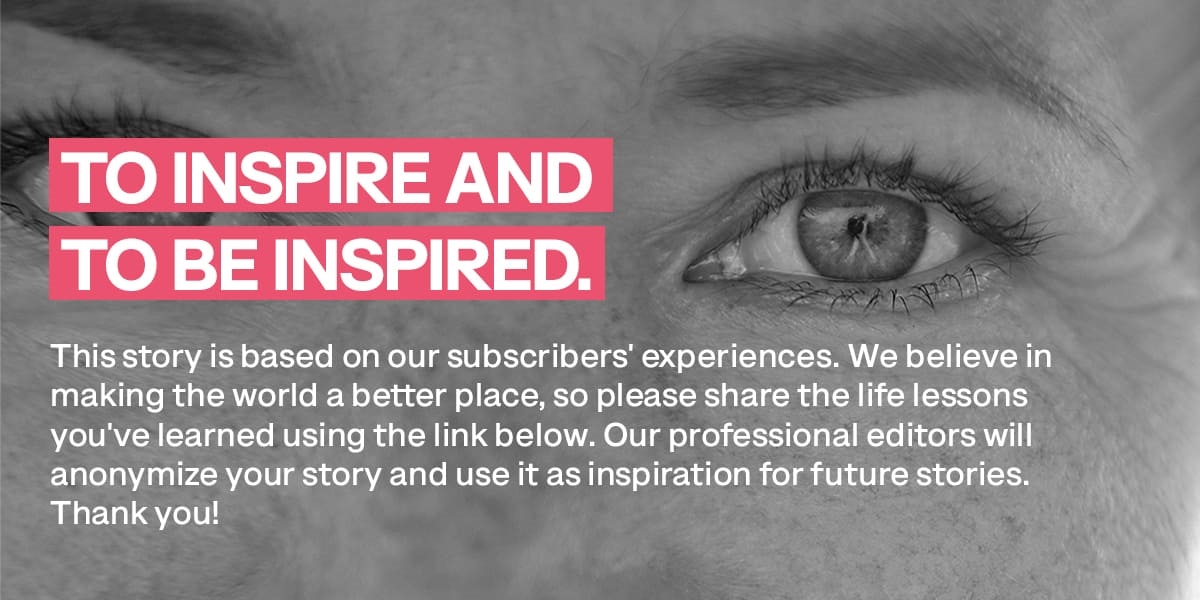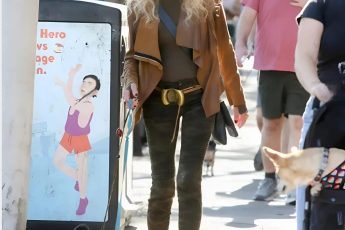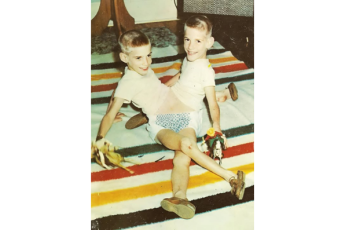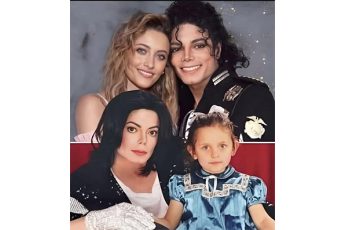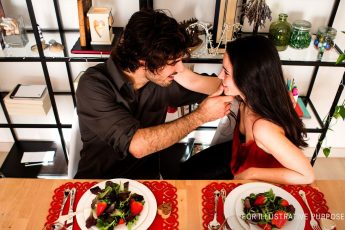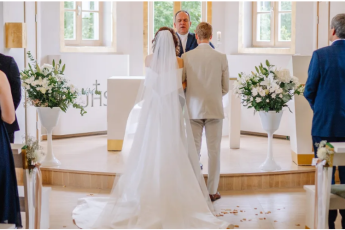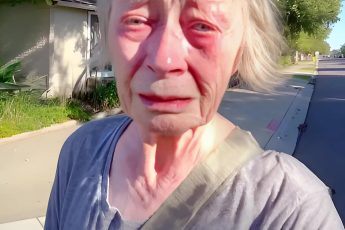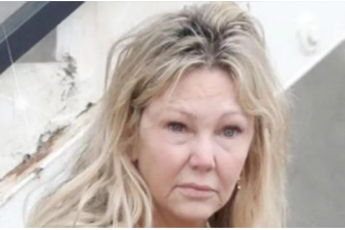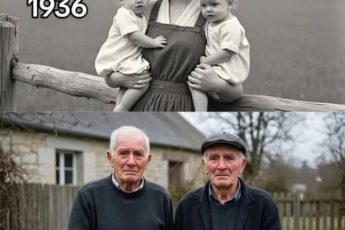Three babies, all under a year old, and I was raising them alone. A storm ripped the roof off my tiny house and stripped away what little security we had. When a rich stranger placed the keys to a beautiful home in my hand, I was sure it was a miracle. Then I stepped into the kitchen and saw the envelope waiting on the counter. That was when I learned his gift came with strings.
My name is Mariam. I’m thirty-one, and my whole world fits into three cribs.
Having three infants at once isn’t just exhausting — it’s like living inside a never-ending alarm clock. I hadn’t slept more than a couple of hours in a row since they were born. My hair lived in a messy bun, my clothes smelled faintly of formula, and my hands were always sticky with something I didn’t have time to identify. The shower was the only place I could cry without anyone seeing.
Their father vanished before they took their first breath.
When I told him I was pregnant — and that there were three heartbeats on the scan — he grabbed his jacket from my couch and backed toward the door, pale as chalk. He muttered that he wasn’t cut out for fatherhood, especially not multiplied by three, and that he “needed to think.” What he really meant was that he needed to disappear. The door closed, his footsteps faded, and so did any sign of him in my life. No calls, no texts, no child support, no apology.
Most of the time I was too drained even to be angry. Hatred takes energy, and all my energy went into making bottles, changing diapers, and trying to tell the difference between three different cries that somehow all sounded urgent.
The only reason we had a roof at all was because my parents left me their small house when they died in a car crash three years earlier. It was nothing fancy — two bedrooms, uneven floors, a porch that leaned slightly to one side, and a kitchen that always smelled like my mother’s cooking no matter what I made. But it was ours. No landlord, no rent notices slid under the door, no fear of eviction.
In the evenings, when one of the boys refused to settle, I would sit on the porch in my mom’s old rocking chair with a baby tucked against my chest, watching the sun sink behind the tall oaks. On good nights there was a mild breeze, fireflies, and the illusion that maybe, just maybe, everything would turn out okay.
Then the weather report changed everything.
The local anchor’s voice sounded calm, but the red swirls on the map said otherwise. A hurricane was pushing toward our town, gathering strength over warm water. People rushed to gas stations and stores; shelves emptied; neighbors nailed plywood over their windows. I tried to act like it was just another storm so I wouldn’t panic the babies — or myself.
The night the hurricane hit, the wind screamed like a freight train circling our house. The lights flickered once, twice, and then the power died completely. Rain hammered the roof so loudly I could barely hear the babies crying. I moved them into the hallway, the safest place I could think of, and sat on the floor with one child in my arms and the other two in carriers beside me, humming whatever lullabies I could remember.
Somewhere around midnight, I heard the sound that still makes my stomach twist: a long, tearing groan followed by a deafening crack.
The roof over the living room gave way.
Cold rain poured straight into the house. The wind ripped curtains off their rods and sent them snapping into the air like flags. I yanked the boys closer, heart pounding, and watched water rush across the floor toward us. The air smelled of wet dirt, splintered wood, and fear.
A neighbor banged on my door, yelling my name. He had a flashlight and a plastic poncho and one of those calm voices people get when they’re terrified but trying not to show it. He helped me wrap the babies in blankets, and together we dashed through the downpour to his truck. I climbed into the backseat with all three boys pressed against me, shivering as the storm swallowed our home behind us.
By morning, our house looked like someone had sliced it open with a giant knife. The roof had peeled back; insulation and broken shingles littered the yard. The porch, my little sanctuary, sagged even more under the weight of debris. From a distance I could see the frame of a picture still lodged in a cracked window: a photo of my parents holding me as a toddler, smiling like they believed the world would always be kind.
We spent the next few days at a high-school gym turned emergency shelter. Cots lined the basketball court. Children cried, adults argued, volunteers moved in a constant blur. I filled out forms for assistance with a pen that kept skipping, my brain foggy from lack of sleep and the constant noise.
That’s where I met Jenna, a volunteer with a messy ponytail and a clipboard she treated like a shield. She brought me diapers, formula, and a kind of brisk kindness I hadn’t realized I needed. She didn’t pity me; she problem-solved.
“You’re not going back in that house until someone says it’s safe,” she told me after seeing the photos on my phone. “For now, let’s get you and the boys somewhere that isn’t a gym.”
Under her guidance, we ended up in a small, musty motel room that smelled faintly of cigarettes and bleach. It wasn’t home, but at least we had a door we could close. Still, each time I changed a diaper on the sagging bed or tried to warm a bottle with rusty tap water, I thought of my parents’ house — our house — sitting wounded and exposed under a blue tarp.
Days blurred into weeks. I filled out aid applications. I called numbers that stayed busy or rang without answer. When help did arrive, it came in tiny pieces: a food voucher, a grocery gift card, a bag of secondhand baby clothes. None of it could patch a roof or move us out of limbo.
One afternoon, Jenna showed up at the motel looking strangely excited and a little nervous.
“Mariam, do you remember that photo in your broken window?” she asked, sitting on the edge of the bed. “The one of you and the babies that the local paper ran after the storm?”
I did. A photographer had snapped it while I stood outside the ruined house, one baby in my arms, the other two asleep in their carriers. I’d been too tired to argue.
“Well,” Jenna said, taking a breath, “someone saw it. A donor. He has a foundation. And he wants to help you.”
I laughed before I could stop myself. “Help how? With a check for a roll of duct tape?”
She shook her head. “No. It’s bigger than that. He wants to give you a house.”
My brain refused to process the words. “Give me… a house?”
“There’s a property his foundation recently acquired,” she explained. “It’s fully furnished, in good condition, and sitting empty. He feels it would be better used by someone trying to rebuild than left vacant. He asked if you’d be willing to see it.”
I looked at the boys. One was chewing determinedly on his own sock. Another had drooled on my shoulder. The third was trying to roll off the bed. I thought of going back to the broken house, of starting from scratch, of months — years — of repairs I couldn’t afford.
“What’s the catch?” I asked quietly.
Jenna hesitated. “There’s a letter waiting for you there, from him. It explains everything. He wanted you to read it in the house itself.”
The word “catch” rattled around in my head, but so did another one: “home.”
A few days later, Jenna drove us to see it.
The new house sat on a quiet street lined with trees. It had a small front yard, a freshly painted porch, and windows that weren’t cracked or boarded up. Flower beds, actually planted and alive, framed the walkway. It looked like something from a life I’d imagined for other people, not for myself.
I unbuckled each baby from their car seat, juggling diaper bags and pacifiers, my heart pounding. We walked up the path slowly, as if one wrong move would make the whole place dissolve.
The front door key felt heavy in my palm. When I turned it, the lock clicked smoothly — no sticking, no jiggling, no familiar creak. The front room smelled faintly of fresh paint and lemon cleaner. Light streamed in through spotless windows. There were couches that didn’t sag, a coffee table without scratches, and framed prints on the walls instead of water stains.
“How does it feel?” Jenna asked softly.
“Like I broke into someone else’s life,” I whispered.
In the kitchen, everything gleamed: stainless steel appliances, unchipped counters, cabinets that closed properly. On the island, propped against a small vase of white flowers, lay an ivory envelope with my name written in careful, looping handwriting.
My stomach tightened. This was the part I hadn’t let myself think too hard about.
I set the babies in their car seats on the floor, where they blinked up at the unfamiliar ceiling, and picked up the envelope. The paper felt thick and expensive, the kind that doesn’t bend easily.
Inside was a letter, several pages long, written in the same neat hand.

I read the opening lines slowly, lips moving as my eyes scanned the words.
He introduced himself as Logan, founder of the Foundation for Renewal. He wrote that he’d grown up in a poor neighborhood, that a house fire had once taken everything his family owned, and that a stranger’s kindness had kept them from ending up on the street. That experience, he said, shaped his mission: to help families rebuild after disasters, both natural and personal.
He said he’d seen the photo of me standing in front of my shattered house with three tiny boys and had felt something twist inside his chest. He’d zoomed in and noticed the picture frame in the broken window behind us, the one of my parents, and imagined what they might have wanted for their daughter and grandsons.
Then came the part my eyes kept tripping over.
He was offering this house for us to live in. The foundation would cover the mortgage, taxes, and basic maintenance for a set period. After that, I would have options: I could take on the payments gradually as my financial situation improved, or the foundation would help me refinance. There was even mention of financial counseling and childcare assistance.
But this wasn’t a no-strings-attached gift.
In exchange, he asked that I agree to be the “face” of one of the foundation’s new initiatives — a campaign highlighting families who had rebuilt their lives with support. It would involve allowing my story and photos to be used in promotional materials, attending a few events, and speaking briefly at the foundation’s annual charity gala.
There were also conditions written in the kind of language that made me feel suddenly inadequate: I had to live in the house as my primary residence, keep it in reasonable condition, avoid renting it out, and notify the foundation if I ever chose to move. If I broke any of those rules, the foundation reserved the right to reclaim the property.
At the bottom of the letter, just above his signature, were three lines that stopped me cold:
“You are not a charity case. You are a partner in this work. I am not rescuing you; I am investing in what you’ll build from here.”
With sincere regards,
Mr. Logan
Founder, Foundation for Renewal.
I read the letter twice. Then a third time. The paper crackled a little as my grip tightened.

Part of me wanted to scream.
So this wasn’t a miracle out of nowhere. I was being asked to turn my life into a story — into content — so a wealthy man and his organization could raise more money. It felt like being plucked from the wreckage only to be placed under a spotlight.
Another part of me, the part that lay awake in the motel doing math in my head until I cried, whispered that I would never be able to give my children something like this on my own. Not with three babies, no childcare, and a resume full of jobs I’d quit to care for others.
I sat down at the kitchen table and buried my face in my hands. From the floor, one of the boys let out a sharp cry, and the other two followed, like an echo.
“This is it,” I told Jenna later, holding the letter out to her. “This is the price.”
She read it carefully, her expression unreadable.
“Mariam,” she said finally, “I can’t tell you what to do. But I will say this: you’ve already been living as if everything depends on you. Maybe it doesn’t have to.”
“What if they make me parade my pain around like a show?” I asked. “What if I stand up in front of a room full of people in designer clothes and become the tragic mom with triplets they can feel good about helping?”
Her eyes softened. “Then you own your story instead of letting them own it. You tell it in your words. And if you ever feel like they’re crossing a line, you say so.”
That night, after the babies finally drifted off to sleep in borrowed cribs in the motel room, I spread the letter out on my lap. I pictured the collapsed roof of my old house, the mold already creeping in. I pictured my parents’ faces in that shattered window. And I pictured the kitchen I’d just walked through, the one that didn’t leak when it rained.
I signed.
Within a week, we moved in.
The first night in the new house, I kept waiting for someone to knock on the door and tell me there had been a mistake. I listened for imaginary footsteps on the porch while the boys slept in matching cribs in the nursery down the hall. Every creak made me think of lawyers or social workers taking it all back.
It took a few days for reality to sink in. To realize that when the babies woke up crying at 3 a.m., I could walk down a hallway that wasn’t warped from water damage. That the ceiling above us was whole. That I didn’t have to set buckets out when it rained.
I called the boys into the living room one afternoon — though they were too young to understand — and spun slowly in a circle with one of them on my hip.
“We live here now,” I whispered, more to myself than to them. “This is ours. At least for a while.”
The gala invitation arrived two months later, tucked into another white envelope with the foundation’s logo embossed on the front.
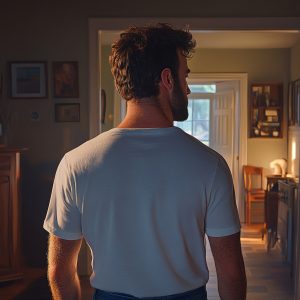
The card inside was thick, the kind that probably cost more than my grocery bill. It listed a date, a location, and an elegant dress code. There was a short note from Logan asking if I’d be willing to share a bit of my story that night. “Nothing too formal,” he’d written. “Just speak from the heart.”
My first thought was that I had nothing to wear. My second was that I had no idea how to stand in front of wealthy strangers and talk about how close I’d come to losing everything.
Jenna came to the rescue again, rifling through a closet of donated clothes earmarked for another fundraiser until she found a navy dress that somehow fit. She insisted it made my eyes look brighter. I insisted I felt like a kid wearing her mother’s clothes.
The night of the gala, I left the boys with a trusted neighbor and rode in the back of a car the foundation sent. As the city lights blurred past the window, I pressed my palms against my knees to keep them from shaking.
The ballroom looked like something that belonged in a movie, not in the world of motel rooms and emergency shelters. Crystal chandeliers poured warm light over polished floors. Waiters glided between tables carrying trays of sparkling drinks. Women in gowns that shimmered when they moved laughed quietly; men in tailored suits leaned together, their conversations a low hum I couldn’t quite catch.
I stood near the back wall, tugging at the hem of my borrowed dress, feeling like an impostor who’d slipped in by accident.

Logan took the stage to gentle applause. Seeing him in person was jarring. He was older than I’d pictured, with silver hair, kind eyes, and the kind of posture that made you think he’d spent a lifetime carrying responsibilities on his shoulders. He spoke about hurricanes and fires, about families who had lost everything, about the difference a stable home could make. It was polished, practiced, but there was a rawness underneath that surprised me.
“And tonight,” he said at one point, “you’re going to hear from someone who’s living this journey right now. Someone who reminds us why this work isn’t just about writing checks. It’s about showing up.”
My stomach dropped as he said my name.
Walking to the stage felt like wading through wet cement. A hundred eyes turned toward me, some kind, some curious, some simply expectant. The microphone looked huge. My voice, when it finally came, sounded thin to my own ears.
I didn’t read a speech. I couldn’t have, even if I’d written one. Instead, I told them about the night the roof ripped off my house. I told them about trying to hush three babies in the dark while rain poured into our living room. I told them about seeing my family home gutted by wind and water, about filling out forms in a noisy gym, about sleeping in a motel while wondering if I was failing my sons.
Then I told them about the letter.
I told them I had struggled with the idea that my pain was being turned into a story to raise money. That part felt risky to say, but it also felt necessary. I said I’d signed anyway, not because I wanted to be anyone’s symbol, but because I wanted my boys to grow up somewhere that didn’t tremble every time a storm rolled in.
I told them the truth: that I was grateful, terrified, suspicious, and hopeful all at once.
As I spoke, the room grew quieter. A few people wiped their eyes. When I finished, there was a beat of silence before the applause began — not the explosive kind you see on TV, but a steady, genuine sound that rolled over me like a warm tide.
Afterward, people approached me one by one. They thanked me. They told me about their own hard seasons. Some pressed business cards into my hand. Others simply squeezed my fingers and moved on. It was strange, seeing my life reflected back at me in their reactions.
Later, when the crowd had thinned and the band had shifted to softer music, Logan found me standing near a tall window, staring out at the city lights.
“Thank you,” he said, coming to stand beside me. “You didn’t sugarcoat anything. That matters.”
“I wasn’t sure how honest I was allowed to be,” I admitted.
He smiled faintly. “If we can’t handle the truth, we don’t deserve to call this charity.”
He paused, then added, “I know this wasn’t a simple decision for you, accepting the house.”
“Nothing about this has been simple,” I replied. “I’m still trying to figure out where gratitude ends and obligation begins.”
“That line will always be blurry,” he said quietly. “For both of us.”
A week after the gala, an email arrived.
He wanted to know if I’d consider working for the foundation — not as a mascot or a symbol, but as an employee. They needed someone organized, empathetic, and experienced with chaos to help run the office and coordinate with families. The position came with a salary and health insurance. It also came with the possibility that someday I’d be able to afford the payments on the house myself.
Two weeks later, I sat behind a desk with my name on a small plaque. The work was demanding and often emotional, but in a different way than my previous struggles. I learned how the grants were processed, how site visits were scheduled, how decisions were made. I also learned that not every story had a neat ending and that sometimes the best the foundation could do was offer a stepping stone instead of a full rescue.
At home, the boys grew steadily. They learned to pull themselves up on the coffee table, to toddle down the hallway, to giggle at their own reflections in the sliding glass door. The house, once a stranger’s gift, began to fill with our noise, our toys, our photos.

On quiet nights, after all three finally surrendered to sleep, I sat on the front porch swing — the one Logan had insisted on adding when he heard how much I’d loved the creaky rocker at my old place. From that spot, I could see the tops of the trees swaying gently, hear a distant dog barking, smell someone’s dinner drifting in the cool air.
Sometimes I thought about the old house, now just a shell with “condemned” notices on its door. I thought about the photograph in the window, the one of my parents. In my imagination, I brought that photo into the new kitchen and set it on the counter next to the still-folded letter. I liked to think they would have approved — not just of the house, but of me finally letting someone help.
I also thought about the cost.
Because there had been one, no matter how kindly it was wrapped. Saying yes meant allowing my story to be told over and over, in newsletters and videos and donor meetings. It meant occasionally standing up in front of strangers and letting them see the parts of my life I once tried to hide. It meant trusting that the people using my story were doing so with integrity.
But it also meant stability. It meant my boys could grow up somewhere that didn’t scare them every time thunder rolled in. It meant dentist appointments and pediatrician visits and a savings account that wasn’t always empty.
I still kept the letter in a drawer, its edges softened from how many times I’d unfolded it.
Sometimes I pulled it out and reread the lines that had scared me the most at first: “I am not rescuing you; I am investing in what you’ll build from here.”
On my worst days, that sentence felt like pressure, another expectation I might fail to meet. On my better days, it felt like a hand extended, not to drag me, but to steady me as I climbed.

One evening, after putting the boys down and washing dishes in our not-leaking sink, I sat at the kitchen table with a cup of tea and realized something that made my chest ache in a new way.
I wasn’t just a recipient anymore.
At the foundation, I was the one calling families after fires, floods, and storms. I was the one listening to the catch in their voices as they tried to pretend they were fine. I was the one walking them through forms the way Jenna once walked me through mine. I found myself writing my own letters — shorter, less polished, but trying to carry the same message: You are not alone in this.
Somewhere along the way, the house had stopped feeling like a loan from a stranger and started feeling like a base from which I could reach back for others.
As I write this now, the boys are asleep down the hall, their breathing soft and even. The nightlight in their room glows like a tiny moon. Through the living-room window, I can see the porch swing swaying gently in the evening breeze.
I think about the storm that tore my old life apart, about the photograph in the broken window, about the man who saw it and decided my story wasn’t over. I think about the letter that almost made me say no, and about the version of myself who signed it anyway, hands shaking.
Am I glad I agreed to his terms? Yes. Not just because of the roof over our heads or the job that lets me pay my bills without constant panic, but because of what I’ve learned in the process.
I’ve learned that accepting help doesn’t mean you’re weak; sometimes it means you’re wise enough to know you can’t do everything alone. I’ve learned that gifts can come with conditions and still be real, still be valuable. I’ve learned that survival is rarely graceful and that rebuilding is often messy.
Most of all, I’ve learned that being seen — really seen — in your most vulnerable moment can be terrifying, but it can also be the first step toward healing.

If this story has touched you, there’s another one that has stayed with me. It’s about a woman whose life shifted the morning she decided not to ignore a small, trembling voice at the back of a school bus. The air was bitterly cold that day, and she was exhausted, lost in her own thoughts, until she heard quiet sobs behind her. What she discovered when she went to check on the child changed not only his world, but hers as well.

This tale, like mine, is a piece of fiction rooted in the kinds of real events that happen every day. Names, places, and details have been changed to protect privacy and to respect the people whose experiences inspired it. Any similarity to actual individuals or situations is coincidental. The writer and publisher cannot guarantee complete accuracy and are not responsible for how anyone interprets or relies on this story.
If you’d like to share your own journey — the one you carry quietly in the back of your mind — you can send it to info@amomama.com. Somewhere out there, another person might need to hear it to believe that their own life isn’t over yet.

